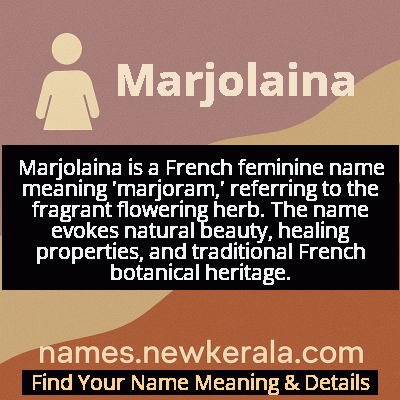Marjolaina Name Meaning & Details
Origin, Popularity, Numerology Analysis & Name Meaning of Marjolaina
Discover the origin, meaning, and cultural significance of the name MARJOLAINA. Delve into its historical roots and explore the lasting impact it has had on communities and traditions.
Name
Marjolaina
Gender
Female
Origin
French
Lucky Number
4
Meaning of the Name - Marjolaina
Marjolaina is a French feminine name meaning 'marjoram,' referring to the fragrant flowering herb. The name evokes natural beauty, healing properties, and traditional French botanical heritage.
Marjolaina - Complete Numerology Analysis
Your Numerology Number
Based on Pythagorean Numerology System
Ruling Planet
Uranus (Rahu)
Positive Nature
Strong sense of order, loyal, practical, and disciplined.
Negative Traits
Stubborn, overly serious, rigid, and prone to feeling restricted.
Lucky Colours
Blue, gray.
Lucky Days
Saturday.
Lucky Stones
Blue sapphire.
Harmony Numbers
1, 7, 8.
Best Suited Professions
Managers, engineers, accountants, organizers.
What People Like About You
Dependability, discipline, practicality.
Famous People Named Marjolaina
Marjolaine de Montpellier
Herbalist and Healer
Renowned for developing medicinal recipes using marjoram and other herbs in medieval France
Marjolaine Rousseau
Botanical Illustrator
Created detailed botanical drawings of French flora for scientific publications
Marjolaine Dubois
Perfumer
Pioneered natural fragrance extraction methods and founded a luxury perfume house
Marjolaine Chevalier
Environmental Activist
Led conservation efforts for native French wildflowers and medicinal plants
Name Variations & International Equivalents
Click on blue names to explore their detailed meanings. Gray names with will be available soon.
Cultural & Historical Significance
Throughout French history, Marjolaina has maintained its association with natural healing and domestic arts. In medieval times, marjoram was considered a protective herb, often used in wedding ceremonies and hung in homes to ward off negative energies. This gave the name connotations of safeguarding and nurturing. During the 18th and 19th centuries, as botanical studies gained prominence, Marjolaina became associated with scientific curiosity and the preservation of traditional knowledge. The name carries echoes of rural French life, where knowledge of herbs and plants was essential to daily living and community wellbeing.
Extended Personality Analysis
Individuals named Marjolaina are often characterized by their nurturing and healing nature, reflecting the medicinal properties of their namesake herb. They tend to be compassionate, intuitive, and possess a natural ability to comfort others, much like the soothing qualities of marjoram in traditional remedies. These individuals typically exhibit strong connections to nature and often demonstrate artistic or creative talents, particularly in fields involving scents, flavors, or natural elements. Their presence is often described as calming and restorative, with an innate understanding of emotional needs.
Marjolainas are known for their resilience and adaptability, mirroring the hardy nature of the marjoram plant that thrives in challenging conditions. They possess a quiet strength and determination, often serving as the emotional anchor in their relationships and communities. While they may appear gentle, they have a core of steadfast reliability and practical wisdom. Their approach to life combines traditional values with innovative thinking, making them excellent problem-solvers who honor heritage while embracing progress. This balance of tenderness and toughness makes them particularly effective in caregiving roles, education, or any profession requiring both empathy and practical action.
Modern Usage & Popularity
In contemporary times, Marjolaina remains a relatively rare but cherished name in France and French-speaking regions, experiencing a modest revival as part of the trend toward nature-inspired and vintage names. While it never reached the popularity of more common floral names like Rose or Marguerite, it maintains a steady presence, particularly in southern France and among families with connections to herbalism, gardening, or environmental causes. The name appeals to parents seeking something traditional yet distinctive, with strong cultural roots and positive natural associations. Recent years have seen increased interest in the name due to growing awareness of sustainable living and herbal medicine, though it remains outside the top 500 names in most French-speaking countries.
Symbolic & Spiritual Meanings
Symbolically, Marjolaina represents healing, protection, and happiness across multiple cultural traditions. The marjoram plant from which the name derives has long been associated with joy and marital bliss in European folklore, often used in wedding bouquets and love spells. In herbal symbolism, it signifies comfort and emotional healing, with its fragrant leaves representing the soothing of troubled spirits. The plant's hardiness and ability to thrive in rocky soil symbolizes resilience and the ability to find beauty and purpose in challenging circumstances. Additionally, marjoram's use in culinary and medicinal contexts gives the name connotations of nourishment, both physical and spiritual, and the transformation of simple elements into something beneficial and beautiful.

